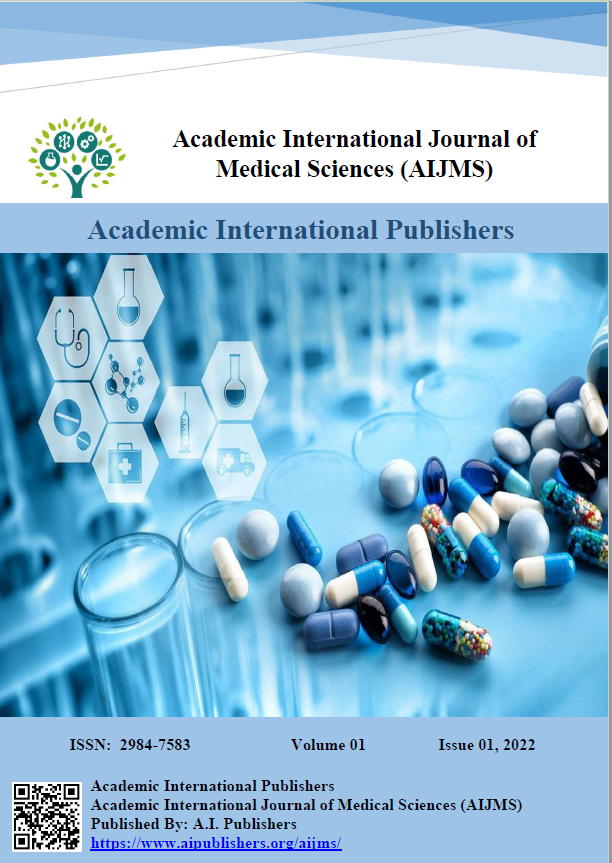The Association Between Oral and Mental Health
DOI:
https://doi.org/10.59675/M113Keywords:
Oral Health ,Mental HealthAbstract
Patients with mental disorders, neuromuscular disorders, and psychiatric disorders are exposed to many oral and dental disease risk factors. It's difficult to overlook the connection between oral and mental health. The behavioural effects of stress, depression, and anxiety are the most obvious explanation for the correlation. These disorders cause people to lose attention to their oral health habits, leading to serious dental problems. Depression, for example, may lead to people brushing and flossing at irregular times, skipping dentist appointments, eating unhealthy foods, and self-medicating with cigarettes.while the connection between mental health and overall physical health has been extensively researched, little attention has been paid to the relationship between mental health and dental health.
The rising number of people suffering from mental illnesses is a worldwide problem. People who suffer from psychiatric conditions have a higher risk of co-morbidity and have substantially worse oral health than the general community. Their oral health, on the other hand, is largely unnoticed and unaddressed [1] Mental and dental health are linked, with poor mental health leading to poor oral hygiene, leading to social anxiety and low self-esteem. Dental anxiety is one of the most visible mental health disorders that directly impact oral health. Dental anxiety is described as a fear of going to the dentist, whether for an operation or a routine checkup [2]. These fears can derive from a negative experience, a fear of dental equipment such as needles and drills, or anxieties passed down from others' experiences. Dental anxieties may lead to a dental phobia, causing patients to stop going to the dentist entirely, resulting in more serious oral health concerns such as gum disease or early tooth loss, as well as physical health issues such as heart disease or lung infections.
On the other hand, neuromuscular disorders can undoubtedly have a variety of effects on the oral cavity. The oral and maxillofacial area is affected by a wide number of neuromuscular disorders. During the intra-oral and extra-oral examination, oral physicians find defects in the dentition, soft tissues, and occlusion caused by these disorders. Patients with neuromuscular conditions must also be handled with extra caution during dental treatment.
References
Kenny A, Dickson-Swift V, Gussy M, Kidd S, Cox D, Masood M, et al. Oral health interventions for people living with mental disorders: protocol for a realist systematic review. International journal of mental health systems. 2020;14:1-9.
Griffiths J, Jones V, Leeman I, Lewis D, Patel K, Wilson K, et al. Oral health care for people with mental health problems guidelines and recommendations. London: British Society for Disability and Oral Health. 2000.
Furuta M, Yamashita Y. Oral health and swallowing problems. Current physical medicine and rehabilitation reports. 2013;1(4):216-222.
Ortega O, Parra C, Zarcero S, Nart J, Sakwinska O, Clavé P. Oral health in older patients with oropharyngeal dysphagia. Age and ageing. 2014;43(1):132-137.
Klobucar R, Kingsmill V, Venables V, Bisase B, Nduka C. A dental perspective of facial palsy. Faculty Dental Journal. 2012;3(4):202-207.
Hatipoğlu H, Kabay SC, Hatipoğlu MG. Multiple Sclerosis and Dentistry: A Contemporary Evaluation. Turkish Journal of Neurology. 2015;21(1):1-6.
Einarsdóttir ER, Gunnsteinsdóttir H, Hallsdóttir MH, Sveinsson S, Jónsdóttir SR, Olafsson VG, et al. Dental health of patients with Parkinson's disease in Iceland. Special Care in Dentistry. 2009;29(3):123-127.
van Stiphout MA, Marinus J, van Hilten JJ, Lobbezoo F, de Baat C. Oral health of Parkinson’s disease patients: a case-control study. Parkinson’s Disease. 2018 May 8;2018.
King G, Chiarello L. Family-centered care for children with cerebral palsy: conceptual and practical considerations to advance care and practice. Journal of Child Neurology. 2014;29(8):1046-1054.
Balasubramaniam R, Sollecito TP, Stoopler ET. Oral health considerations in muscular dystrophies. Special Care in Dentistry. 2008;28(6):243-253.
Saft C, Andrich JE, Müller T, Becker J, Jackowski J. Oral and dental health in Huntington‘s disease-an observational study. BMC neurology. 2013;13(1):1-5.
Yarom N, Barnea E, Nissan J, Gorsky M. Dental management of patients with myasthenia gravis: A literature review. Oral Surgery, Oral Medicine, Oral Pathology, Oral Radiology, and Endodontology. 2005;100(2):158-163.
Patil PM, Singh G, Patil SP. Dentistry and the myasthenia gravis patient: a review of the current state of the art. Oral surgery, oral medicine, oral pathology and oral radiology. 2012;114(1):e1-e8.
Chaveli López B, Gavaldá Esteve C, Sarrión Pérez MG. Dental treatment considerations in the chemotherapy patient.
Patil PM, Singh G, Patil SP. Dentistry and the myasthenia gravis patient: a review of the current state of the art. Oral surgery, oral medicine, oral pathology and oral radiology. 2012;114(1):e1-e8.
Cademartori MG, Gastal MT, Nascimento GG, Demarco FF, Corrêa MB. Is depression associated with oral health outcomes in adults and elders? A systematic review and meta-analysis. Clinical oral investigations. 2018;22(8):2685-2702.
Clark DB. Dental care for patients with bipolar disorder. Journal-Canadian Dental Association. 2003;69(1):20-24.
Gao SS, Chu CH, Young FYF. Oral Health and Care for Elderly People with Alzheimer’s Disease. International Journal of Environmental Research and Public Health. 2020;17(16):5713.
Downloads
Published
Issue
Section
License
Copyright (c) 2023 Academic International Journal of Medical Sciences

This work is licensed under a Creative Commons Attribution-NoDerivatives 4.0 International License.





